Why Building Trust and Accountability in Investigations Is the Cornerstone of Public Confidence
Building trust and accountability in investigations is essential for the legitimacy of any organization. Fair, transparent, and consistent investigations protect everyone involved. Poorly conducted ones lead to severe consequences, including eroded culture, financial losses exceeding $20 million from retaliation claims, and a workforce that stays silent about misconduct.
Key Strategies for Building Trust and Accountability in Investigations:
- Establish clear, written protocols for every stage of the investigation process.
- Ensure impartiality by assigning conflict-free investigators.
- Document thoroughly to create an objective, defensible record.
- Communicate findings clearly to all parties.
- Hold wrongdoers accountable with fair and consistent corrective action.
- Address persistent issues proactively.
- Leverage technology for secure reporting and case management.
The stakes are high. While 52% of employees witness inappropriate behavior, 58% remain silent due to fear, futility, or lack of trust in the process. This silence damages organizational integrity, increases legal risk, and undermines morale.
However, evidence-based strategies like standardized protocols and independent oversight can transform investigations into a mechanism for justice. Data-driven systems have improved case resolution rates by over 30% and best practices have cut case backlogs by 25%.
I'm Joshua McAfee, and my career in law enforcement and corporate loss prevention has shown me the impact of both good and bad investigations. My mission at McAfee Institute is to build trust and accountability by training professionals to conduct rigorous and fair investigations. This guide provides principles to help you lead investigations that people can trust, turning enforcement into legitimacy and accountability into progress.
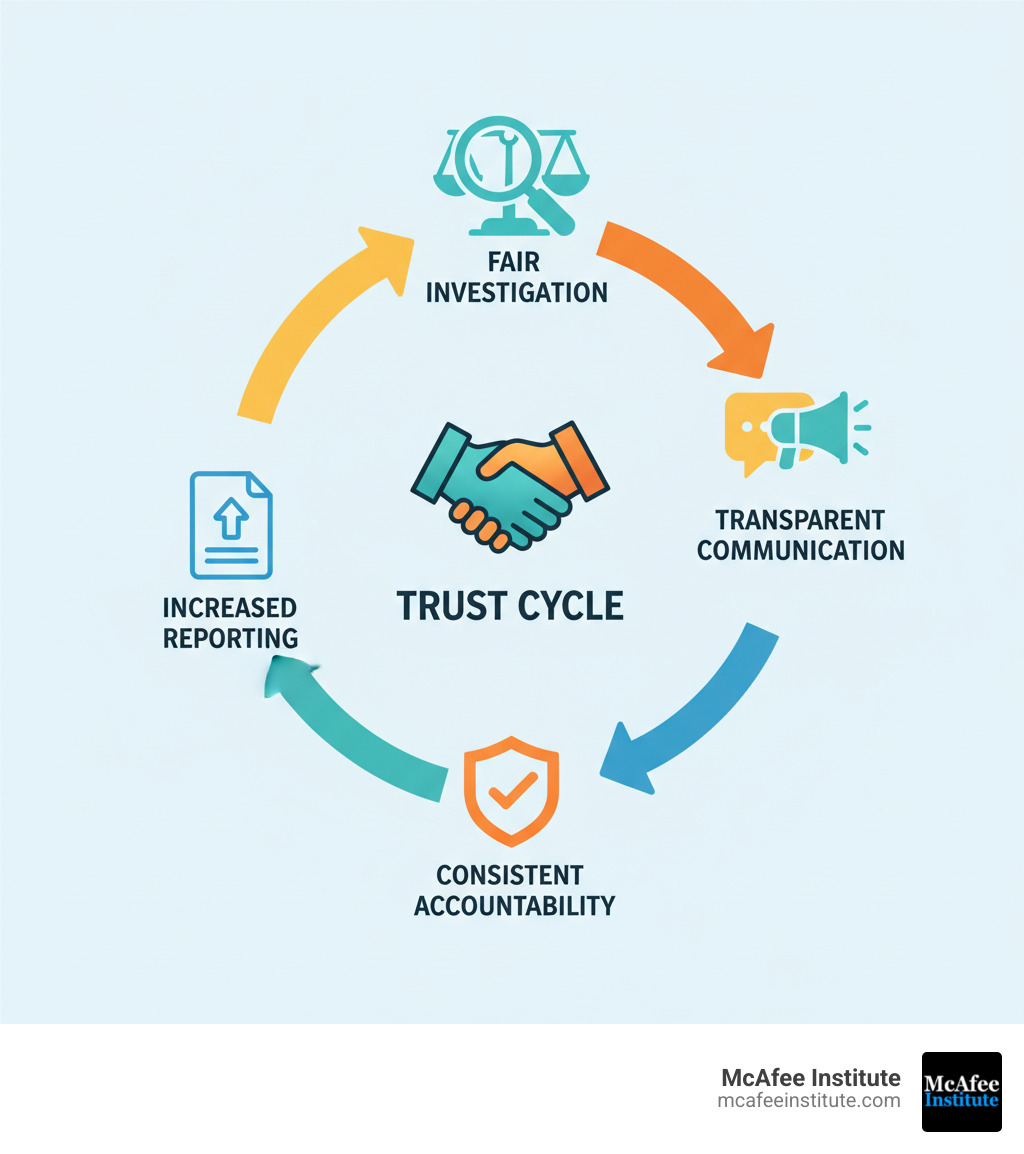
The Foundation: Why Trust and Accountability are Non-Negotiable
Trust is the foundation of any organization, and investigations are the ultimate test of that trust. How they are handled determines whether people remain confident in the institution or lose faith. Building trust and accountability in investigations is not just a moral imperative; it protects your organization from catastrophic consequences.
Failed investigations erode workplace culture, hinder collaboration, and carry a staggering financial impact. Workplace retaliation has historically cost organizations more than $20 million in documented costs alone.
The High Cost of Silence and Inaction
An even bigger problem is employee silence. When people don't trust the process, they stop reporting issues. While 52% of employees witness misconduct, a shocking 58% of these individuals remain silent. They fear retaliation or believe nothing will change, often because they've seen no meaningful action from their organization in the past.
This silence allows toxic behavior to spread, creating legal time bombs and turning good employees into disengaged ones. The cost of this inaction is far higher than the cost of conducting proper investigations. Investing in a trustworthy process prevents catastrophic losses.
Core Principles of a Fair Investigative Process
Building investigations people trust starts with six core principles:
- Fairness: Treat every person with dignity and respect.
- Transparency: Explain the process clearly, respecting confidentiality.
- Consistency: Handle similar situations similarly, with no special treatment.
- Timeliness: Avoid delays that amplify anxiety and signal a lack of seriousness.
- Objectivity: Follow the evidence without bias, even when it's uncomfortable.
- Due Process: Ensure everyone understands their rights and has a chance to be heard.
These practical tools transform investigations from something people dread into a process they can trust, encouraging them to report problems earlier.
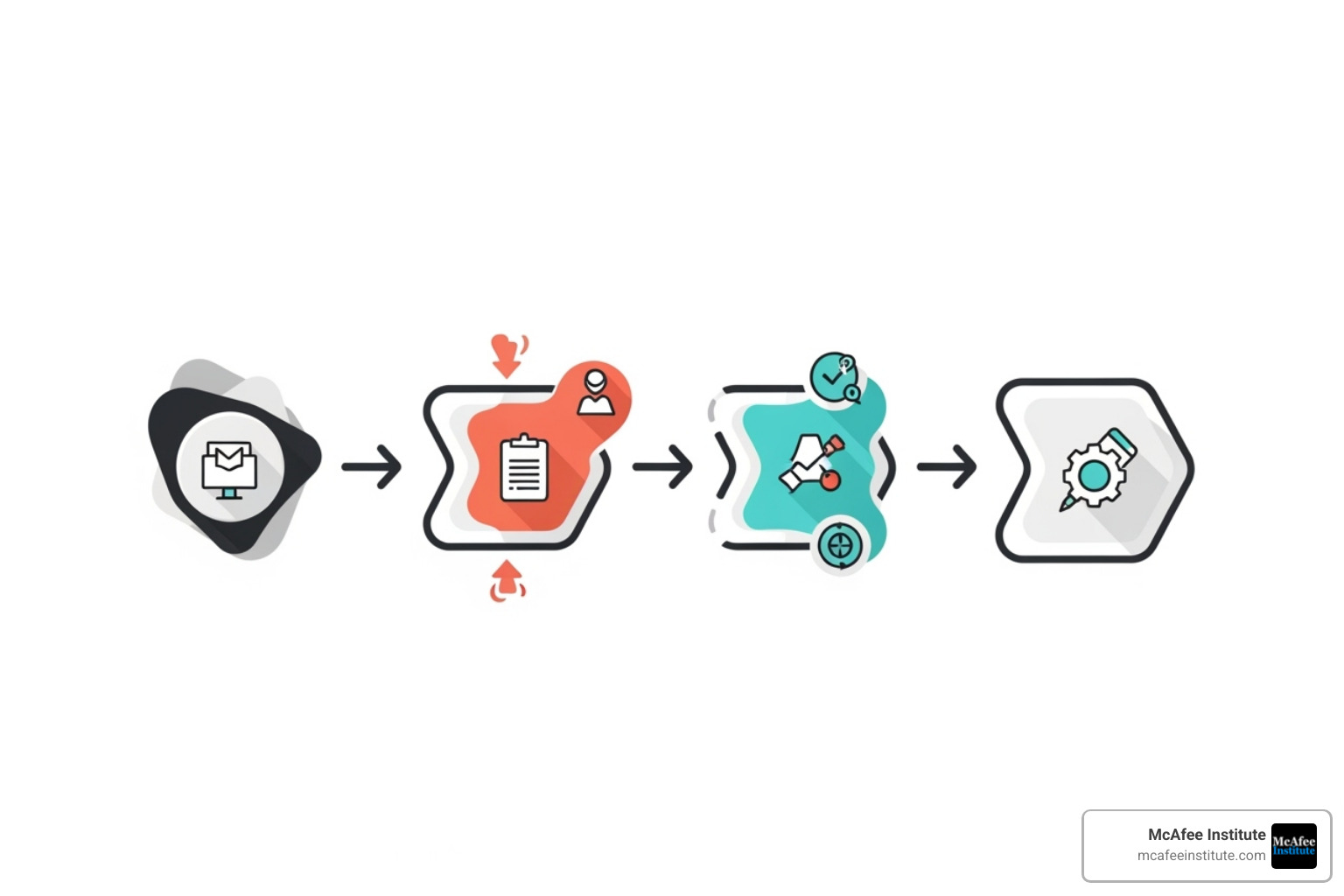
The Blueprint for Fairness: Implementing Protocols for Building Trust and Accountability in Investigations
Good intentions are not enough in an investigation; a solid, repeatable system is what builds trust and holds up under scrutiny. When building trust and accountability in investigations, a reliable blueprint is key. Evidence shows that standardized procedures and data-driven systems can improve case resolution rates by over 30% and cut case backlogs by 25%.
Establishing Clear and Transparent Investigation Protocols
A clear investigation protocol ensures every case follows the same reliable path. It should map out the entire journey: complaint intake, investigator assignment, timelines, interview guidelines, and evidence handling, including a strict chain of custody to maintain credibility.
Defining roles and responsibilities is just as important. When everyone knows their part, the process flows smoothly without confusion. A structured guide can provide a framework, while advanced training like our Certified Professional Criminal Investigator (CPCI) program helps professionals master these processes.
The Critical Role of Thorough Documentation
Poor documentation can sink an investigation. It serves as your objective record, memory, and proof. A complete record should include:
- The initial complaint
- A clear investigation plan
- Detailed interview notes and summaries
- Evidence logs tracking all information
- Final report drafts and communication records
This documentation creates an objective record that ensures consistency and supports your findings. For detailed guidance, see our resource on How to Write an Investigation Report: A Step-by-Step Guide.
Communicating Findings with Clarity and Empathy
Poor communication of findings can undermine an entire investigation. Delivering outcomes requires both clarity and empathy. The complainant and the subject both need to understand the findings, the rationale, and any corrective actions in plain language.
Managing expectations is crucial, especially when privacy or legal constraints limit what can be shared. Closing the loop with all parties, even in unsubstantiated cases, shows their concerns were taken seriously. This counters the cynicism that leads to employee silence and encourages future reporting. This final step is where investigations either build trust or break it.
The Human Element: Fostering a Culture of Integrity and Safety
Detailed protocols are useless if people don't feel safe speaking up. The real work of building trust and accountability in investigations happens within the organizational culture. When a culture prioritizes integrity, investigations become opportunities for justice and improvement, not just damage control.

Leadership's Role in Building Trust and Accountability in Investigations
Leaders create the environment where investigations succeed or fail. Setting the tone from the top means allocating resources (time, trained personnel, technology), modeling ethical behavior, and holding managers accountable for creating a non-retaliatory environment. As experts note, it's essential for this accountability to be visible and consistent.
Effective leadership requires strategic thinking and the courage to address uncomfortable truths. Our Certified Executive Leader (CEL) certification helps leaders develop these capabilities.
Creating Psychological Safety to Encourage Reporting
The silence of employees who witness misconduct often stems from a lack of psychological safety: the freedom to speak up without fear of punishment. Creating this environment requires enforcing strong non-retaliation policies and whistleblower protections.
Organizations must consistently demonstrate that people who come forward are valued. When employees trust the process will be fair, they are more likely to report issues early, before they escalate.
Beyond Physical Safety: The Impact of a Strong Safety Culture
A strong safety culture goes beyond physical measures; it's about the shared values, actions and behaviors that demonstrate a commitment to safety over competing goals and demands. This includes treating psychological and emotional safety with the same seriousness as physical safety through proactive risk management and training.
Committing to this broader vision of safety shows employees their well-being is a priority, which builds the trust necessary for accountable investigations. Our Workplace Violence and Threat Specialist (WVTS) certification addresses this holistic approach, recognizing that secure environments are built on open communication and genuine care.
The Independent Lens: Bolstering Public Confidence in High-Stakes Cases
In high-stakes cases, like police lethal force investigations, even a perfect internal process may not satisfy the public. The perception of bias can crumble community trust. The hard truth is that building trust and accountability in investigations sometimes requires an independent, external body to take the lead. This is not an indictment of internal teams, but a recognition that inherent conflicts of interest can make impartiality nearly impossible to prove to a skeptical public.

Challenges and Biases in Internal Investigations
When a police department investigates its own, public confidence is low from the start. Organizational loyalty and shared experiences can create unconscious bias, coloring the interpretation of evidence and leading to perceptions of a "half-hearted" inquiry. This creates a crisis of legitimacy, particularly in communities disproportionately affected by alleged misconduct.
For example, a survey found that 76% of African Americans had little confidence in investigations of police-involved deaths. When a large portion of a community believes the system won't deliver justice, it's an institutional crisis that threatens the legitimacy of law enforcement, as explored in the Harvard Law Review's article on Enhancing Accountability and Trust with Independent Investigations of Police Lethal Force.
| Feature | Internal Investigations | Independent Investigations |
|---|---|---|
| Investigator Allegiance | To the employing agency, potential for organizational bias | To an external body, designed for neutrality |
| Public Perception | Often viewed with skepticism, perceived as self-serving | Generally higher trust, perceived as unbiased |
| Transparency | Can be limited by internal policies and confidentiality | Designed for openness, often with public reporting mandates |
| Potential for Bias | High due to inherent conflicts of interest and loyalty | Significantly lower, due to structural separation |
The Role of Impartiality and Objectivity in Building Trust and Accountability in Investigations
The solution is structural independence. Investigations by external bodies increase public confidence because they are seen as fair. Countries like the United Kingdom, Norway, and Canada have pioneered civilian oversight models where independent agencies with real investigative power handle police misconduct cases. These structures correlate with higher public trust in the justice system.
Ethical interviewing techniques also bolster trust. The Principles on Effective Interviewing for Investigations and Information Gathering (the Méndez Principles) advocate for rapport-based, non-coercive methods that respect human rights and produce more accurate information. In high-stakes cases, an independent lens isn't a luxury but a necessity for restoring legitimacy and rebuilding trust.
Leveraging Technology for Improved Trust and Efficiency
Technology is changing investigations, making them more efficient, secure, and trustworthy. Data-driven systems have improved case resolution rates by over 30% and reduced backlogs by 25%. When building trust and accountability in investigations, technology is a pivotal tool for working smarter. As explored in How AI is Transforming the Future of Investigations, these tools are revolutionizing the field.
How Third-Party Reporting and Case Management Software Helps
To counter the 58% of employees who stay silent, third-party software offers anonymous reporting channels that protect identities and encourage people to speak up without fear. These systems also provide a centralized data repository, eliminating scattered files and incomplete records. Automated workflows and notifications keep cases moving, reducing the risk of delays or missed steps. For organizations handling sensitive data, platforms with FedRAMP Certified security offer the highest level of data protection, while secure document sharing allows for controlled collaboration.
Key Features of Effective Investigation Technology
When evaluating investigation technology, several features are essential for building trust:
- Secure and Anonymous Intake: Provides multiple confidential reporting channels (web, phone, email) to encourage reporting.
- Centralized Case Management: Tracks every case from start to finish in one place, ensuring consistency and preventing data loss.
- Automated Workflows & Notifications: Guides investigators, assigns tasks, and keeps stakeholders informed, ensuring nothing falls through the cracks.
- Evidence Management: Securely collects, stores, and organizes evidence with a clear chain of custody to maintain credibility.
- Robust Reporting & Analytics: Turns case data into actionable insights, allowing you to spot trends and demonstrate compliance.
- Role-Based Access Control: Safeguards privacy by ensuring only authorized personnel can access sensitive case information.
Investigators can further improve their digital skills with our guide on 5 Incredible OSINT Techniques to Supercharge Your Investigations in 2025. Technology amplifies human expertise, removing obstacles and creating the transparency that trust requires.
Frequently Asked Questions about Accountable Investigations
What are the first steps to take when a complaint is received?
The initial response to a complaint is a critical opportunity to build trust. The first steps should be to:
- Immediately acknowledge receipt to reassure the complainant they have been heard.
- Assess for immediate risks to safety and take swift action to protect all parties.
- Assign an impartial investigator who is free from any conflicts of interest.
- Create a formal investigation plan outlining the scope, timeline, and initial steps. Resources like the SHRM guide offer structured guidance for this phase. This groundwork is essential for building trust and accountability in investigations.
How can an organization ensure its investigators are impartial?
Impartiality must be actively built into your process. Ensure investigators are free from personal or professional conflicts of interest. Provide regular training on unconscious bias to help them recognize and mitigate their own predispositions. Following standardized protocols minimizes subjective decision-making. For high-stakes cases, consider using a third-party investigator to eliminate even the perception of bias, which is often as important as actual impartiality.
What happens if an investigation is inconclusive?
An inconclusive investigation is not a failure. Sometimes, evidence is insufficient to prove or disprove an allegation. The integrity of the process itself is what matters. In this situation, communicate the outcome honestly to the relevant parties, explaining that a definitive determination could not be made based on the available evidence.
Then, reaffirm anti-misconduct policies and consider if broader training or cultural interventions are needed to address underlying issues. This proactive approach shows that speaking up leads to meaningful action from their organization, reinforcing trust in the system even without a definitive finding.
Conclusion: Leading the Future of Accountable Investigations
Building trust and accountability in investigations is not a luxury; it's the foundation of organizational integrity. The principles of rigorous protocols, impartiality, thorough documentation, transparent communication, and a culture of safety are what separate investigations that heal from those that harm.
Every investigation is an opportunity to demonstrate that fairness matters and that wrongdoing has consequences. Getting it right strengthens our organizations and communities. Getting it wrong erodes trust and incurs massive costs.
The tools and strategies to improve are here. Data-driven systems can boost case resolution by over 30%, and best practices can cut backlogs by 25%. What's needed is a commitment to continuous improvement and professional development.
McAfee Institute empowers professionals with government-recognized certifications that prove mastery in leading fair and effective investigations. Our programs, from the Certified Professional Criminal Investigator (CPCI) to the Certified Executive Leader (CEL) and Workplace Violence and Threat Specialist (WVTS), provide the training today's professionals need. We serve a global community of law enforcement, intelligence, and investigative specialists with lifetime access, live support, and free updates.
The future of accountable investigations depends on trained, value-driven leaders who can create environments where people feel safe to speak up. It's about changing investigations from sources of fear into mechanisms of fairness.
If you're ready to lead investigations that build trust and ensure accountability, take the next step with us. Explore our Board Certifications to become a leader in your field and join a global community shaping the future of accountable investigations.



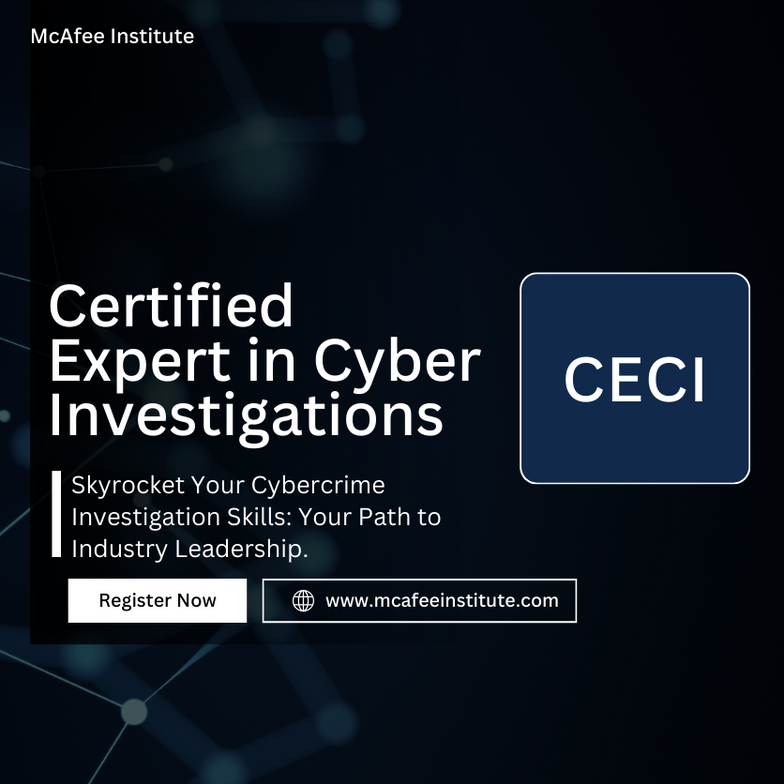
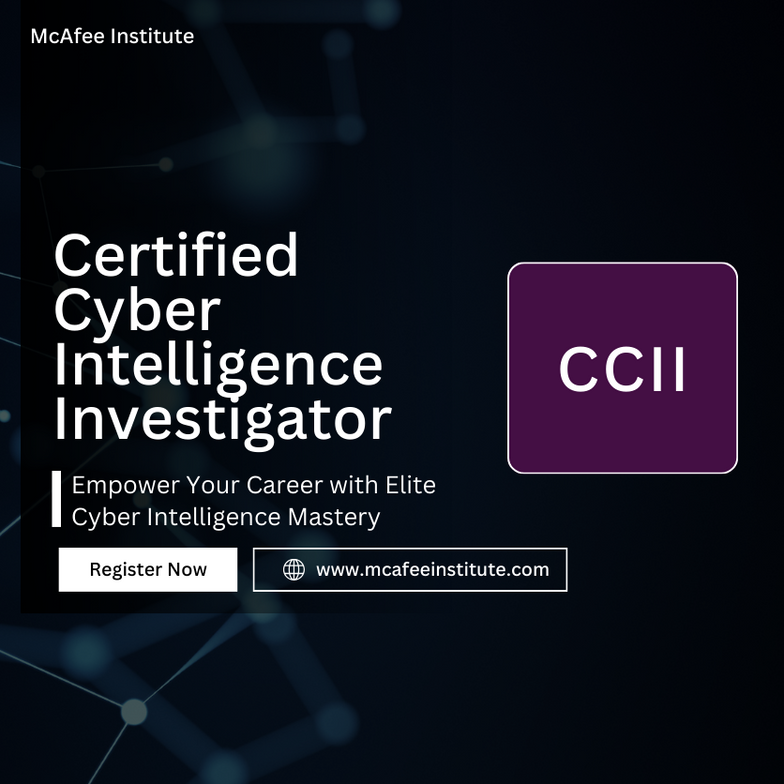

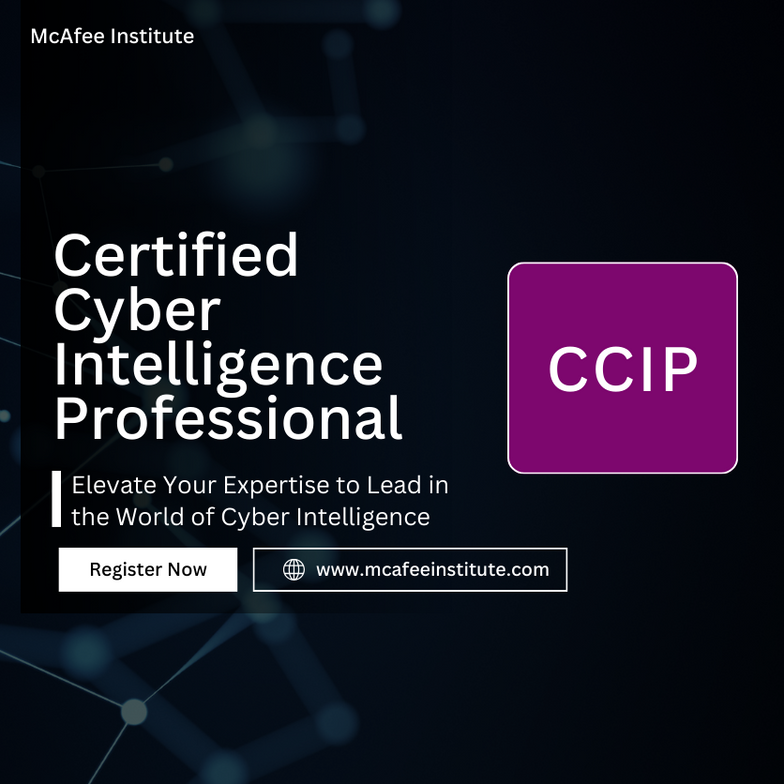



Share:
Beyond the Shadows: The Path to a CIA Intelligence Career
Fact Check: Is McAfee Institute Truly Accredited